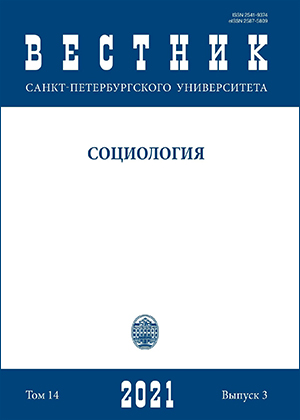Неопределенность в отношении технологии искусственного интеллекта в российском обществе
DOI:
https://doi.org/10.21638/spbu12.2021.305Аннотация
Искусственный интеллект (ИИ) уже сегодня затрагивает многие сферы жизни общества. С одной стороны, его часто связывают с рисками антиутопической слежки, тотальной автоматизации рабочих мест и другими опасностями. А с другой стороны, в обсуждениях немалое место занимают представления о том, что ИИ активно стимулирует инновации и действует как мощный инструмент для решения различных социальных проблем. При этом высокий уровень неопределенности в отношении подобных технологий (в результате их новизны, сложности для неподготовленных наблюдателей, так называемого эффекта «черного ящика», и непредсказуемости последствий распространения) делает вопрос о предстоящем для них будущем особенно подверженным определению (фреймированию) со стороны тех или иных влиятельных социальных групп. Рассмотрение вопросов социального конструирования оценок перспективности технологии ИИ объясняется актуальностью показанного в работе конфликта в российских реалиях между настороженностью населения по отдельным вопросам и амбициозным законодательным целеполаганием. На фоне полюсов скептического и, наоборот, прогрессивного настроя не менее интересны позиции профильных ученых/разработчиков и бизнеса, вынужденных балансировать между этими полярностями в отстаивании собственных интересов. Приведенные материалы суммируют результаты ранее проведенных исследований, а также опираются на изучение государственных документов в интересующей нас сфере, чтобы представить общую картину развития
технологии. В качестве теоретической основы анализа в работе использован неоинституциональный социологический подход к исследованию организационных полей и власти на рынках, развитый Нилом Флигстином. По результатам исследования обозначены направления дальнейшего углубления социологического понимания процессов, происходящих в России вокруг разработки и внедрения искусственного интеллекта.
Ключевые слова:
искусственный интеллект, отношение к технологиям, неопределенность, российское общество
Скачивания
Библиографические ссылки
References
Загрузки
Опубликован
Как цитировать
Выпуск
Раздел
Лицензия
Статьи журнала «Вестник Санкт-Петербургского университета. Социология» находятся в открытом доступе и распространяются в соответствии с условиями Лицензионного Договора с Санкт-Петербургским государственным университетом, который бесплатно предоставляет авторам неограниченное распространение и самостоятельное архивирование.




